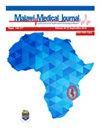铁蛋白/淋巴细胞百分比比值预测COVID-19严重程度和死亡率
IF 0.8
4区 医学
Q4 PUBLIC, ENVIRONMENTAL & OCCUPATIONAL HEALTH
引用次数: 0
摘要
目的探讨新冠肺炎患者铁蛋白/淋巴细胞百分比(FLPR)与临床及影像学疾病严重程度及死亡率的关系。方法对COVID-19聚合酶链反应阳性患者进行回顾性研究。我们通过急诊入院时的实验室检测计算flpr。评估胸部计算机断层扫描(CT)评分、疾病严重程度和FLPR患者30天死亡率之间的关系。结果本研究纳入309例患者。12.3% (n=38)的患者发生30天死亡。FLPR与临床疾病严重程度之间存在统计学上显著的相关性(p <0.001)。在事后分析中,差异是由临界组和严重组引起的,这些组的FLPR明显更高。CT评分与FLPR有显著相关性(r=0.496, p<0.001)。Logistic回归分析显示,高血压、吸烟、c反应蛋白(CRP)和FLPR水平是COVID-19患者死亡的独立危险因素。在接收机工作特性曲线分析中,确定了FLPR的预测值和最佳截止值。白细胞、淋巴细胞、中性粒细胞、铁蛋白、CRP、FLPR曲线下面积分别为0.707、0.233、0.735、0.878、0.831、0.924 (p < 0.001)。该分析表明,在比较中,FLPR可以比其他生物标志物更好地预测30天死亡率。当FLPR的最佳临界值为42.4时,敏感性为84.2%,特异性为86.7%。结论FLPR可作为新冠肺炎患者病情严重程度和死亡率的独立生物标志物。本文章由计算机程序翻译,如有差异,请以英文原文为准。
Ferritin/lymphocyte percentage ratio to predict the severity and mortality of COVID-19
Objective In this study, we aimed to investigate the relationship between ferritin/lymphocyte percentage ratio (FLPR) with clinical and radiological disease severity and mortality in COVID-19 patients. Methods This retrospective study was conducted with patients who had polymerase chain reaction positive results for COVID-19. We calculated FLPRs from laboratory tests taken during emergency clinic admission. The relationship between chest computed tomography (CT) scores, disease severity, and 30-day mortality with FLPR was evaluated.ResultsOur study included 309 patients. 30-day mortality occurred in 12.3% (n=38) of the patients. A statistically significant association was found between FLPR and clinical disease severity (p <0.001). In the post hoc analysis, the difference was caused by the critical and severe groups and FLPR was significantly higher in these groups. A significant correlation was found between CT scores and FLPR (r=0.496, p<0.001). Logistic regression analysis revealed that hypertension, smoking, C-reactive protein (CRP), and FLPR levels were independent risk factors for mortality in COVID-19 patients. In the receiver operating characteristics curve analysis, determined the predictive value and the optimal cut-off value of FLPR. The areas under the curve of WBC, lymphocyte, neutrophil, ferritin, CRP, FLPR were found 0.707, 0.233, 0.735, 0.878, 0.831, 0.924 (p<0.001), respectively. This analysis showed that the FLPR can predict 30-day mortality better than the other biomarkers in the comparison. When the optimal cut-off value of FLPR is 42.4, the sensitivity is 84.2% and specificity is 86.7%.Conclusion FLPR can be used as an independent biomarker of disease severity and mortality in COVID-19.
求助全文
通过发布文献求助,成功后即可免费获取论文全文。
去求助
来源期刊

Malawi Medical Journal
Medicine-General Medicine
CiteScore
1.50
自引率
0.00%
发文量
27
审稿时长
>12 weeks
期刊介绍:
Driven and guided by the priorities articulated in the Malawi National Health Research Agenda, the Malawi Medical Journal publishes original research, short reports, case reports, viewpoints, insightful editorials and commentaries that are of high quality, informative and applicable to the Malawian and sub-Saharan Africa regions. Our particular interest is to publish evidence-based research that impacts and informs national health policies and medical practice in Malawi and the broader region.
Topics covered in the journal include, but are not limited to:
- Communicable diseases (HIV and AIDS, Malaria, TB, etc.)
- Non-communicable diseases (Cardiovascular diseases, cancer, diabetes, etc.)
- Sexual and Reproductive Health (Adolescent health, education, pregnancy and abortion, STDs and HIV and AIDS, etc.)
- Mental health
- Environmental health
- Nutrition
- Health systems and health policy (Leadership, ethics, and governance)
- Community systems strengthening research
- Injury, trauma, and surgical disorders
 求助内容:
求助内容: 应助结果提醒方式:
应助结果提醒方式:


